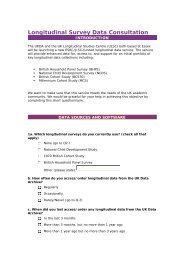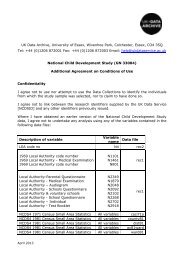ESDS Annual Report, 2008-2009
ESDS Annual Report, 2008-2009
ESDS Annual Report, 2008-2009
You also want an ePaper? Increase the reach of your titles
YUMPU automatically turns print PDFs into web optimized ePapers that Google loves.
The Economic and Social Data Service<br />
The Economic and Social Data Service (<strong>ESDS</strong>) is a distributed national data service established in 2003 by the Economic<br />
and Social Research Council (ESRC) and Joint Information Systems Committee (JISC). <strong>ESDS</strong> was set up to provide enhanced<br />
access and support for an extensive range of key economic and social data, both quantitative and qualitative, spanning many<br />
disciplines and themes. <strong>ESDS</strong> is based on a successful partnership between the Universities of Essex and Manchester, and<br />
comprises six distinct yet inter-related services.<br />
<strong>ESDS</strong> aims and objectives<br />
The overall aim of <strong>ESDS</strong> is to promote wider and more<br />
informed use of data for research and teaching in the social<br />
sciences and to ensure that these data continue to be<br />
available over time.<br />
To achieve this aim <strong>ESDS</strong> will:<br />
> develop a clear, co-ordinated acquisitions strategy in<br />
conjunction with the ESRC and JISC;<br />
> develop and promote common standards and agreed<br />
strategies for data preparation, processing, documentation<br />
and preservation;<br />
> integrate data services through the development of a<br />
universal single point of access and simple registration<br />
procedures and common conditions of use;<br />
2 E C O N O M I C A N D S O C I A L DATA S E RV I C E A N N UA L R E P O RT AU G U S T 2 0 0 8 – J U LY 2 0 0 9<br />
> enhance underlying data sources through the<br />
development of value-added services around key datasets<br />
and series;<br />
> promote increased use of datasets through both general<br />
and specialist user support activities;<br />
> develop interface and analysis tools appropriate to<br />
differing levels of expertise amongst end users;<br />
> respond to key technical developments in the broader<br />
information environment;<br />
> engage on a regular basis with a wide range of<br />
stakeholders, including data suppliers, data funders<br />
and end users.

















